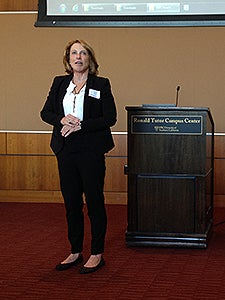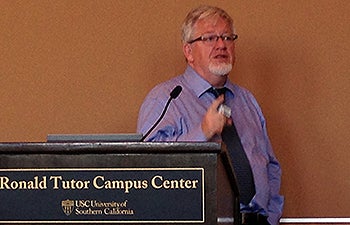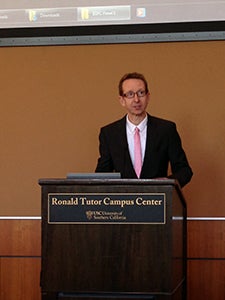On Our Best Behavior
Doctors may be more likely to prescribe antibiotics inappropriately right before lunch, when they are hungry — or just before the end of the day, when they are tired, said Jason Doctor, associate professor of clinical pharmacy at the USC School of Pharmacy, in his presentation at a behavioral science and policy conference on “Health and Wellbeing.”
“About 10 percent of doctor’s visits are for acute respiratory infections,” Doctor said. “In 44 percent of those cases, antibiotics are prescribed. And half of those are inappropriate.”
As a social science researcher, Doctor’s approach to changing the over-prescription paradigm is to conduct studies that tap into physicians’ decision-making systems that are influenced by emotional and social factors, rather than by knowledge and rational thinking.
“We want to avoid what’s called the post-antibiotic future in which people will die from infections due to resistant bacteria that develop as a result of over-prescribing,” he said.
Doctor was among 15 speakers from USC and the Brookings Institution at the conference held Feb. 12 on USC’s University Park campus. The day-long event was divided into four sessions — each addressing a different health concern directly affecting society. The panel discussions were followed by a reception and a session for social science graduate students to present their own research.
The event was designed to foster collaborations between USC and Brookings Institute scholars, along with announcing a partnership between USC social scientists and the Behavioral Science and Policy Association (BSPA), a nonprofit organization associated with Brookings that promotes the application of research to enacting positive public policy.

Wendy Wood, professor of psychology and USC Dornsife’s vice dean for social sciences, organized the conference, which was the first step in a collaboration between USC scholars and the Brookings Institution. Photos by Lizzie Hedrick.
“We are hoping that this sparks shared interests and collaboration on projects in the future,” said Wendy Wood, Provost Professor of Psychology and Business, and USC Dornsife’s vice dean for social sciences, who organized the conference.
The event also celebrated the opening of the Dr. Verna and Peter Dauterive Hall, an interdisciplinary social sciences building that is now home to many USC Dornsife faculty members. Additionally, research covered at the conference will comprise an upcoming special issue of BSPA’s journal Behavioral Science & Policy.
“The strategic vision of this university really calls on our community to come together to do research of consequence,” said Michael Quick, interim university provost, in his opening remarks. “It’s aimed at tangible impact in the world — and we can think of no better place to have this impact than in health and wellbeing.”
USC Dornsife Dean Steve Kay lauded the researchers’ efforts in the quantitative social sciences.
“The hurdle facing everyone in the social sciences is to find proof that your recommendations will be effective,” he said. “It’s being able to study and show definitively what will help people live healthier and more prosperous lives. And proof lives in numbers. It lives in data. It lives in rigorous quantitative analysis.”
Wood’s research, for instance, is aimed at changing health-related behaviors — and, she said, “particularly why we are so bad at it — both in terms of changing our own health behavior as well as devising more formalized interventions on a societal level.”
In her panel presentation, she elaborated on how initiatives such as the “5-a-Day” campaign taught people that they should be eating more fruits and vegetables, but that studies show few people actually did.
“I believe that this has to do with habits — both breaking the old, bad habits that impede behavior change and forming new habits that you can follow over time,” she said, referencing a study on smoking cessation that taught people to stop going to places where they used to smoke or to write in a journal every time they had the urge to smoke a cigarette.

Norbert Schwarz, Provost Professor of Psychology and Marketing and co-director of USC Dornsife’s Mind and Society Center, presents his research at the conference.
Norbert Schwarz, Provost Professor of Psychology and Marketing and co-director of USC Dornsife’s Mind and Society Center, presented studies that may have implications for public health campaigns for vaccination.
In a study, Schwarz gave one group of people a facts-only flyer about the flu vaccine. Another group received a myth-and-facts flyer that also presented popular misconceptions and explained why they were wrong. A third group received no information about the vaccine. Five minutes after reading the materials, more people who received either type of flyer responded on a questionnaire that they would be more likely to get the vaccine than members of the control group.
But for those who filled out the survey 30 minutes later, reading why some beliefs about the vaccine are false caused them to reconsider whether to get the shot. They were less interested in getting the vaccination than those who read no flyer at all.
“Repeating false beliefs in order to correct them actually backfires,” he said. “It reminds people of false beliefs they might have heard before and leaves them thinking that the issue is complicated and controversial.”
Arie Kapteyn, professor of economics and executive director of USC’s Center for Economic and Social Research (CESR), and Arthur Stone, professor of psychology and director of the USC Dornsife Center for Self-Report Science — as well as Dana Goldman, director of the USC Schaeffer Center for Health Policy and Economics at the USC Sol Price School of Public Policy, spoke about health and wellbeing in an aging population.
In the final group, Daphna Oyserman, Dean’s Professor of Psychology and co-director of the USC Dornsife Mind and Society Center, and Dan Benjamin, associate professor of research at CESR — as well as Carol Graham of Brookings, delivered talks on how health decision-making relates to social class.

Interim University Provost Michael Quick comments on USC’s dedication to scholarship of consequence.
“If you are low-income or minority and you see that people around you are gaining weight, or if you go to the doctor and see that you’re not being well-respected, it leads you ask, “Why are healthy outcomes more difficult for me?’” Oyserman said. “I showed in a series of experiments that if you prime people to believe that difficult goals are even harder for them to achieve than other people, they stop trying sooner.”
Oyserman is now investigating how to motivate people to engage in difficult health-related tasks.
“Sometimes easy things are trivial,” she said. “I show that if you prime interpretation of difficulty as importance, people do focus more and work harder, regardless of where they stand in a socioeconomic hierarchy.”
Looking to the future, Wood is confident that the USC-Brookings partnership will continue beyond the conference.
“This was a great first step in crafting evidence-based social policy,” Wood said. “These important insights will allow us to create better policies to promote health and wellbeing. USC is taking a leadership role in showing how this is done.”